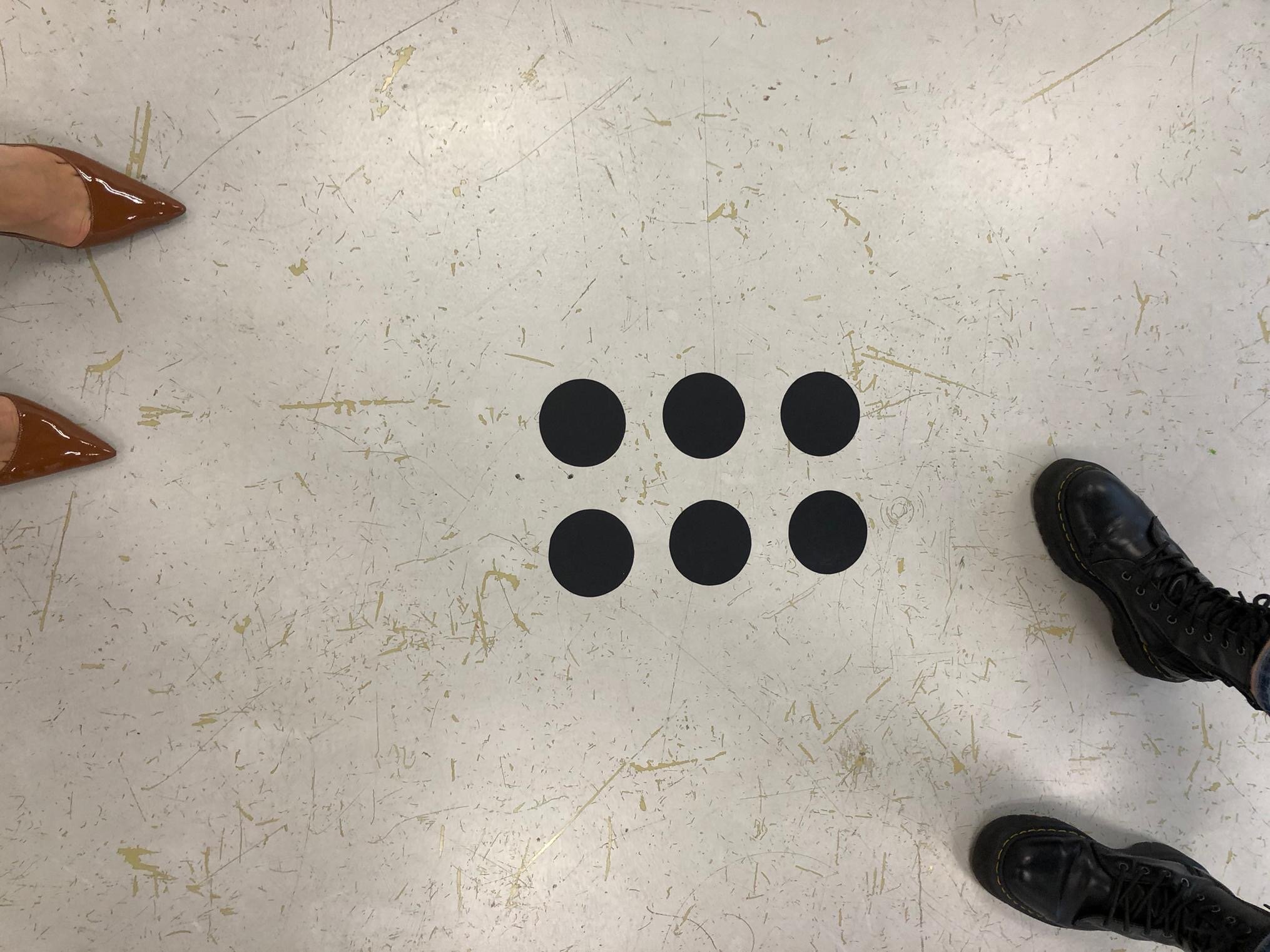W01_Vera Molnar
Biographic data
Quotes from wikipedia, artist statements, descriptions, etc…

Born in Hungary in 1924, Vera Molnar is one of the first women artists to use computers in her practice. Trained as a traditional artist, she studied art history and aesthetics at the Budapest College of Fine Arts and moved to Paris in 1947, where she still lives.
She co-founded several pioneering artist research groups such as G.R.A.V. (Groupe de Recherche d'Art Visuel), which investigate collaborative approaches to mechanical and kinetic art, and the research group for art and computer science at the Institute of Art and Science in Paris.
Pre-dating the computer, she invented algorithms or “machine imaginaire” that allowed the creation of image series following a set of pre-ordained compositional rules. Beginning in 1968, the computer became a central device in the making of her paintings and drawings, allowing her to more comprehensively investigate endless variations in geometric shape and line.
Still active today at the young age of 95, she is the recipient of the first D.velop Digital Art Award (2005), was appointed Chevalier of Arts and Letters (2007), and won the outstanding merit award AWARE in 2018. (veramolnar.com)
Molnar believes one power of the computer is that the random can create an aesthetic shock that ruptures the systematic and symmetrical. The rigor and meticulousness which she applies to her logics, is the human bias that computation and randomness cannot create alone. The work is so powerful because the “randomness” exists within Molnar’s bias.
Molnar is a wonderful example of how the computer can be a powerful tool in the right hands. Her precise, sensitive modulations of placement and angles take minimalist ingredients and create a complex feast for the eyes. In 1968, she became one of the pioneers of computer use in artistic creation, a tool that, in her words, allowed her art to “free itself from a classical heritage sclerotic” while enabling her to maintain full control of her compositions. Vera Molnar today enriches an already renowned body of work with new systematic constructions in bright colors.
Moma: Vera Molnár (born 1924) is a French media artist of Hungarian origin. Molnar is widely considered to be a pioneer of computer art and generative art, and is also one of the first women to use computers in her art practice.Born in Hungary, she studied aesthetics and art history at the Budapest College of Fine Arts. In the 1940s and 50s, she created non-representational paintings. By 1959 she was making combinatorial images; in 1968 she would use a computer to create her first algorithmic drawings. In the 1960s she founded two groups in France concerned with the use of technology within the arts: the Groupe de Recherche d’Art Visuel and Art et Informatique. Her work has been widely collected by major museums; in 2007 she was named a Chevalier of Arts and Letters in France.
- link to short biography
- link to Vera Molnar’s Exploration of the Unimaginable
Started painting at the age of twelve, her first subject matter, nymphs and trees, inspired by an uncle. Soon progressed to more geometrical themes, and in 1968 started working with computers. Her work during this period focused on the breakup of repeating units, often expressed as a series of increasingly fractured images. In order to do away with what she calls "mental-cultural ready-mades," she employs different programmatic games and mathematical principles in order to produce series of work guided by a unifying quest for the invisible.
Vera Molnar holds that the computer can serve four purposes. The first concerns its technical promise---it widens the area of the possible with its infinite array of forms and colors, and particularly with the development of virtual space. Secondly, the computer can satisfy the desire for artistic innovations and thus lighten the burden of traditional cultural forms. It can make the accidental or random subversive in order to create an aesthetic shock and to rupture the systematic and the symmetrical. For this purpose a virtual data bank can be assembled. Thirdly, the computer can encourage the mind to work in new ways. Molnar believes that artists often pass far too quickly from the idea to the realization of the work. The computer can create images that can be stored for longer, not only in the data bank but also in the artist's imagination. Finally, Molnar thinks that the computer can help the artist by measuring the physiological reactions of the audience, their eye movements for example, thus bringing the creative process into closer accordance with its products and their effects. (Source)
Quotes
- “I imagined I had a computer. I created a program and then, step by step, realized simple, limited series, which, though, were self-contained, thus not skipping any shape combination.”
- “It's a paradox, but the people who argued at the beginning that using computers dehumanizes art... the opposite is true. Because it's thanks to all this technology that we can get very close to what we have imagined that we might not have found otherwise.” (Vera Molnar: Randomness https://vimeo.com/372579247)
- “I am a painter, an image-maker, in particular, of images of a nonfigurative kind. I 'create' visual forms in the sense that they consist of combinations of shapes that cannot be found in nature.”
Artworks
Copy and paste images, embed videos, links for galleries of inspiring and descriptive artwork
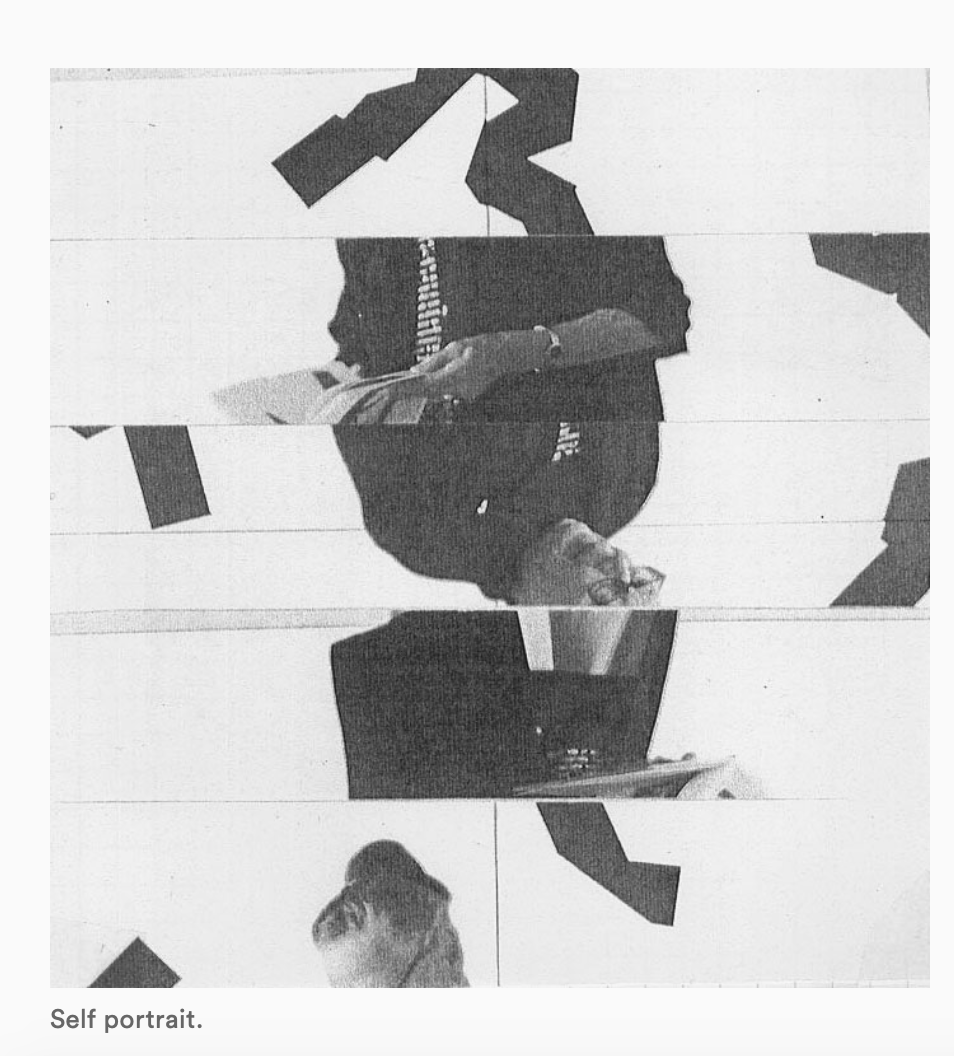
https://opheliaming.medium.com/vera-moln%C3%A1r-the-computer-art-goddess-26a84efbea4b
Spalter Digital Collection: https://spalterdigital.com/artists/vera-molnar/
Vera Molnár’s website: http://www.veramolnar.com/diapo.php?y=1985




My Mother’s Letters is an attempt at simulation, an artificial re-creation of the handwriting of Molnar’s mother.



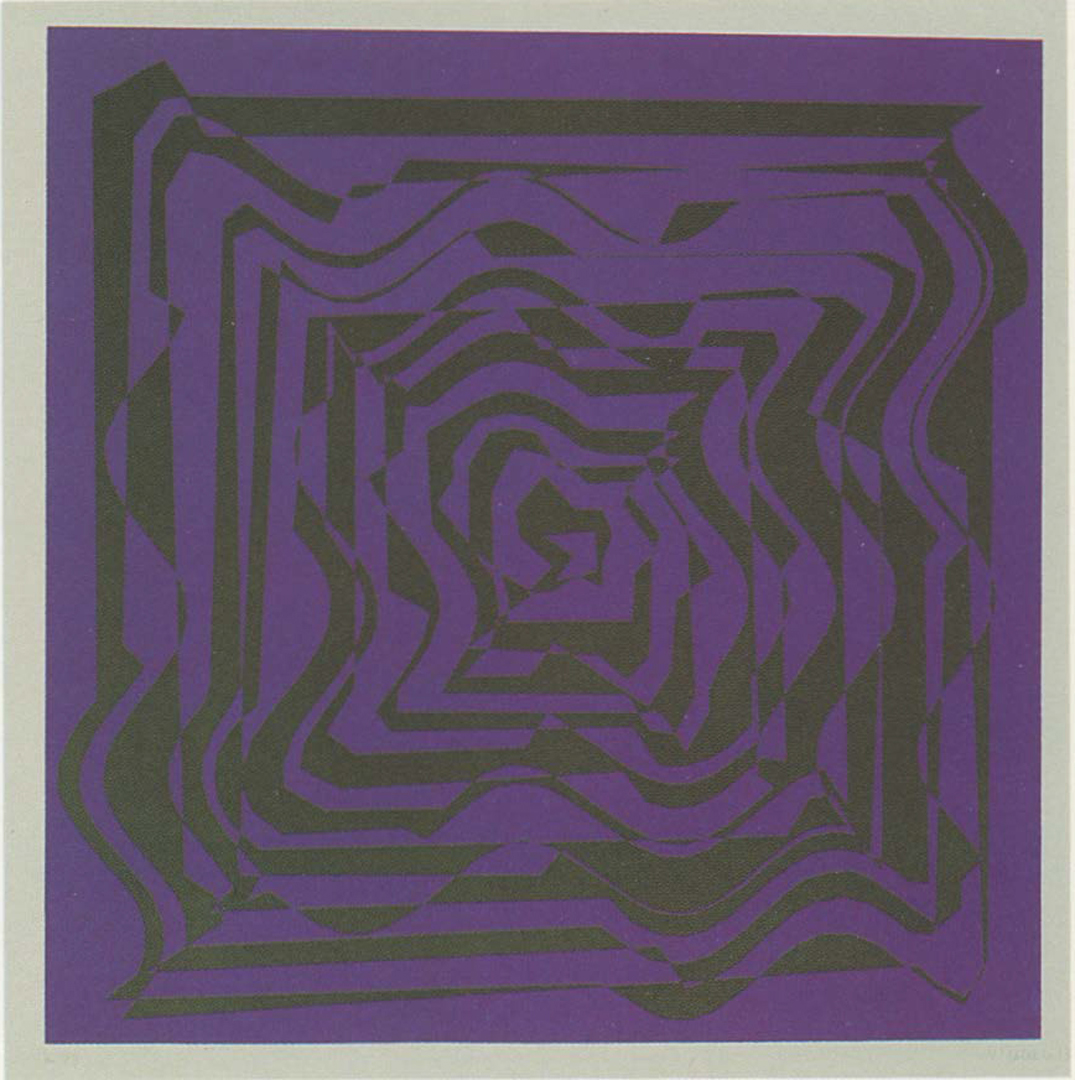








“I was furious, and so I said, “I will go back to squares and rectangles, and I don’t want anything to do with Gaussian curves.” Ten years passed, fifteen maybe, and I had an exhibition in Aix-en-Provence. I opened my shutters, and what do I see? The Gaussian curve through Mont Sainte-Victoire.” (https://brownpoliticalreview.org/2020/05/bpr-interviews-vera-molnar/)
Machine Imaginaire
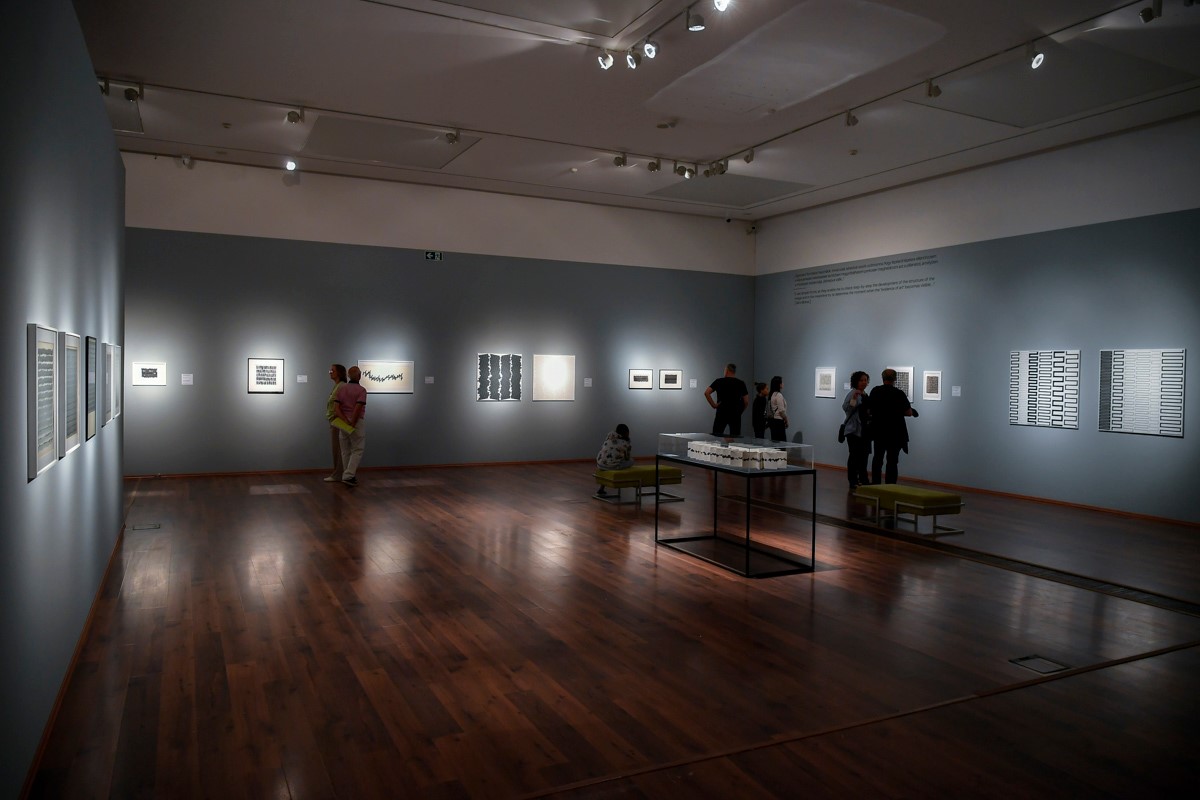
https://visitdebrecen.com/wp-content/uploads/2020/07/veramolnar7.jpg
Books and published work
What books inspired them? “When a few years ago, Vera Molnar bought a small notebook whose pages were each divided into four strips, Raymond Queneau's opus, One hundred thousand billion poems, may have come to mind. But Vera Molnar set her own rules here. With a gouache pen, using four different colours and four different thicknesses she drew, on about a hundred pages, outlines of Mount Sainte-Victoire so dear to Cézanne's heart.” (https://www.bernardchauveau.com/en/artists-books/230-vera-molnar-six-million-seven-hundred-and-sixty-five-thousand-and-two-hundred-and-one-sainte-victoire-9782363060617.html)
What books have they written?
https://en.calameo.com/read/0045073284a4d3aed2145
Toward Aesthetic Guidelines for Paintings with the Aid of a Computer, 1975 📄 PDF Download
Exhibitions
Documentation, links, critics, comments about exhibitions related to the artist.
SOLO EXHIBITIONS
2020
Vera Molnar. Promenades en carré, 18. October 2020 – 11. April 2021, Museum Ritter, Waldenbuch, Germany
2019
Vera Molnar, MuDA, Zurich
Disorder in Order, Kiscell Museum, Budapest
Drawings and Paintings 1947 – 1986, Senior & Shopmaker Gallery, New York
The 1980s, DAM GALLERY Berlin
D’autres lignes, Galerie La Ligne, Zurich
Retrospektive, Galerie Linde Hollinger, Ladenburg
2018
Véra Molnar. Une ligne, Musee de beaux-arts de Caen
2017
Spielerisch, Minimal, DAM Gallery, Berlin
Quarte Vingt Treize (93), Bernard Chauveau/ Galerie 8+4, Paris, France
2016
1% de désordre ou la vulnérabilité de l’angle droit, Galerie Berthet-Aittouarès, Paris, Frankreich
2015
Papiers, Fondation Lius Moret, Martigny, Switzerland
Regarding the Infinite – Drawings 1950 -1987, Senior & Shopmaker Gallery, New York, USA
concentriue 1958 – 2012, März Galerie, Mannheim, Germany
Vera Molnar. (Un)Ordnung. (Des)Ordre. Museum Haus Konstruktiv, Zürich, Switzerland
2014
Mes 90 ans à la Ligne, Galerie La Ligne, Zürich, Switzerland
Solo, DAM GALLERY Berlin, Germany
Vera Molnar. (Un)Ordnung. (Des)Ordre, Museum für Konkrete Kunst, Ingolstadt, Germany
Née en 1924, Granville Gallery, Paris, France
2013
Tremblement, Collection Nationale de l´Edition et de l´Art Imprime, Paris, France
Compredre, c´est transformer, Galerie Oniris, Rennes, France
Vom sichtbaren zum lesbaren, Museum der Wahrnehmung (MUWA), Graz, Austria
Une bréve histoire des lignes, Centre Pompidou Metz, France
Errances, Galerie Cour Carrée, Paris, France
2012
One Percent Disorder, Institut Kepes, Eger, Hungary
Vera Molnar, Kunsthaus Rehau, Institut für Konstruktive Kunst und Konkrete Poesie, Rehau, Germany
Vera Molnar, Une Rétrospective 1942 – 2012, Musée des Beaux Arts de Rouen, France
2011
Gothique, DAM GALLERY Berlin, Germany
86 (Part III), Galerie Torri, Paris, France
2010
86 (Part II), Galerie Torri, Paris, France
86, Galerie Torri, Paris, France
Tourner en rond?, Galerie Cour Carrée, Paris, France
Variations Ste-Victoire, Musée des Beaux-Arts, Budapest, Hungary
60 ans de carrés, Galerie Oniris, Rennes, France
2009
Perspectives et variations, Frac Lorraine, Metz, France
Né en 1924, Galerie März, Mannheim, Germany
2008
Pliages, tableaux, dessins, Galerie März, Mannheim, Germany
The early Beginnings – plotter drawings 1969 – 1990, DAM GALLERY Berlin, Germany
Hommage à Dürer (with François Morellet), Musée Vasarely, Budapest, Hungary
Hommage à Paul Klee, Galerie La Ligne, Zurich, Switzerland
Hommage à Dürer, variations (with François Morellet), Musée de PAKS, Hungary
2007
Car je n’aime pas la couleur verte, Musée des Beaux-Arts de Rouen, France
Vers l’épure, Galerie Cour Carrée, Paris, France
M…, Galerie Oniris, Rennes, France
Lignes, Galerie März, Ladenburg, Germany
2006
Parallèles (avec MCBA), Galerie La Ligne, Zurich, Switzerland
Tableaux et séries, März Galerien, Ladenburg, Germany
Vera Molnar, Etudes et multiples, März Galerien, Mannheim, Germany
Monotonie, symétrie, surprise, Kunsthalle Bremen, Bremen, Germany
Histoires D’I, La Galerie Kandler, Toulouse, France
Vera Molnar. Studien und Multiples, März Galerien, Mannheim, Germany
2005
Droites et courbes, Galerie Cour Carrée, Paris, France
Vera Molnar, Galerie Charpa, Valencia, Spain
Signes et signatures, Galerie Oniris, Rennes, France
Vera Molnar et Marta Pan. Thèmes et variations, Musée des Beaux-Arts de Brest, France
2004
Grecques, après tremblement de terre, Artothèque, Auxerre, France
M comme Malevitch und andere Buchstabenbilder, März Galerien, Mannheim, Germany
Vera Molnar. Als das Quadrat noch ein Quadrat war … Retrospektive zum 80. Geburtstag, Wilhelm-Hack-Museum, Ludwigshafen, Germany
Vera Molnar et Julije Knifer. Lignes et méandres, Fondation pour l’art contemporain Claudine et Jean-Marc Salomon, Alex, France
2003
Hasards canalisés, Galerie Guttmann, Budapest, Hungary
Dessins, März Galerien, Mannheim, Germany
2002
Vera Molnar, Espace Fanal, Basel, Switzerland
Variations, Galerie Oniris, Rennes, France
Tableaux, März Galerien, Ladenburg, Germany
Hasards preinèdites, Galerie Cour Carrée, Paris, France
2001
Des chemins sinueux, März Galerien, Mannheim and Ladenburg, Germany
Fragments de Méandres, Ungarisches Kulturinstitut, Stuttgart, Germany
Peintures, collages, dessins, Musée de Grenoble, France
Vera Molnar presentée par Galerie Oniris, Fiac 2001, Paris, France
Entre droites et courbes, Galerie Emilia Suciu, Ettlingen, Germany
reConnaître – Vera Molnar, Musée de Grenoble, France
2000
Lignes, Galerie Oniris, Rennes, France
Au crayon, à la plume, au pinceau, à l’ordinateur, Centre d’Art Contemporain Bouvet-Ladubay, Saumur, France
Computerzeichnungen, Galerie St. Johann, Saarbrücken, Germany
Lettres de ma mère, Centre d’Art de Marnay-sur-Seine (CAMAC), France
Oeuvres récentes, Galerie Oniris, Rennes, France
Promenade à Ladenburg, März Galerien, Ladenburg, Germany
1999
Une visite guidée à travers mon cerveau, Espace Gustave-Fayet, Sérignan, France
Inventar – Hommage zum 75. Geburtstag von Vera Molnar, März Galerien, Ladenburg, Germany
Vera Molnar: Extrait de 100.000 milliards de lignes, Centre de Recherche, d‘Échange et de Diffusion pour l’Art Contemporain (CRÉDAC), Ivry-sur-Seine, France
Solo d’un trait noir, Galerie Florence Arnaud, Paris, France
1998
Lettres de ma mère, Galerie Florence Arnaud, Paris, France
Sensibilité numérique, Vismara Arte, Milano, Italy
Sculptures, dessins, Espace de Luynes, Chevreuse, France (with Marta Pan)
Vera Molnar, Manfred Mohr, Galerie Lahumière, Paris, France
1997
Peintures 1966-1996, Galerie Oniris, Rennes, France
Salon Liszt: Lettres de ma mère, Institut Hongrois de Paris, France
Tango, Château Bouchemaine, France
1996
Pink und Rouge, März Galerien, Mannheim and Ladenburg, Germany
Tango, Musée d’Art et d’Histoire, Cholet, France
4 livrimages, École des Beaux-Arts, Valenciennes, France
Oeuvres sur papier, Galerie Florence Arnaud, Paris, France
Ligne, Múzeum Ernst, Budapest, Hungary
Géométrie au XXème-siècle, Galerie Le Faisant, Strasbourg, France (with Friedrich Riedelsberger)
1995
De l’Esprit à l’Oeuvre, Musée d’Art et d’Histoire, Cholet, France
Tableaux, März Galerien, Mannheim, Germany (with François Morellet)
1994
Tableaux dessins, März Galerien, Mannheim and Ladenburg, Germany
Ordres et (Dés)ordres,Wilhelm-Hack-Museum, Ludwigshafen, Germany
Géometrie du Plaisir, Gesellschaft für Kunst + Gestaltung, Bonn, Germany
Multiples, März Galerien, Mannheim, Germany
Oeuvres récentes, Galerie Quadri, Bruxelles, Belgium (with Michel Jouët)
Vera Molnar. “Sommaire” 1992-93, März Galerien, Mannheim and Ladenburg, Germany
1992
Travaux anciens, Galerie St. Johann, Saarbrücken, Germany
1990
Museum für moderne Kunst, Studio A, Otterndorf, Germany
Galerie St. Johann, Saarbrücken, Germany
Vera Molnar. Lignes, Formes, Couleurs, Vasarely Múzeum, Budapest, Hungary
Stiftung für konkrete Kunst, Reutlingen, Germany
Neuf carrés, Gesellschaft für Kunst + Gestaltung, Bonn, Germany
Les Gothiques, Galerie St. Charles de Rose, Paris, France
1989
Rouges, Galerie Municipale Edouard Manet, Gennevilliers, France
Dialogue entre émotion et méthode II, Galerie Emilia Suciu, Karlsruhe, Germany
Rouges II, Fondation Vasarely, Aix-en-Provence, France
Tracés et traces, Institut Hongrois de Paris, France
1988
Dialogue entre émotion et méthode, Galerie E, Zurich, Switzerland (with Max Bill)
1984
Vera Molnar, Publishing House Lundquist, Lund, Sweden
Rechteckaufbau, Galerie Circular, Bonn, Germany
Creatic, Galerie du Cirques Divers, Liège, Belgium
Ostinato, Galerie 30, Paris, France
Studio X, Neapel, Italy
1983
Galleri Sankt Olof, Norrköping, Sweden
1981
Inclinaison – (étude préliminaire à une toile), Crédit Agricole, Caen, France
Galleri Ferm, Malmö, Sweden
1979
Vera Molnar. Paris – Caen, Atelier de Recherche Esthétique à Caen, France
Club der jungen Künstler, Budapest, Hungary
1977
Galleri Ferm, Malmö, Sweden
1976
Transformations Polytechnic of Central London, UK
GROUP EXHIBITIONS 2019 Automat und Mensch, Kate Vass Galerie, Zurich Alchimie des lignes, Galerie Oniris, Rennes Code&Algorithm, Hommage a Vera Molnar, Vazarely Muzeum, Budapest 2018 Dürer Cézanne Klee, Galerie Berthet-Aittouares SUMMER SPLASH 4, DAM GALLERY Berlin 2017 VERA MOLNAR – RÁKÓCZY GIZELLA – SZÍJ KAMILLA, Galerie Vintage, Budapest WRITING NEW CODES – Cordeiro / Mallary / Molnar, The Mayor Gallery, London 2016 [un]erwartet. Die Kunst des Zufalls, Kunstmuseum Stuttgart, Germany
Bartók, Muzeum Ludwig, Ludwig Museum – Museum of Contemporary Art, Budapest, Hungary
2015
AESTHETICA, DAM Gallery Berlin, Germany
2014
Rapport de Force, Galerie Cour Carrée, Paris, France
Abstraction/Figuration, Musée des Beaux arts de Rennes, France
Evénement plastique, Galerie Pascal Janssens, Ghent, Belgium
La Passion Dürer, Musée Jenisch, Vevey, Switzerland
Vera Molnar & Torsten Ridell, aller simple, Longjumeau-Champlan, France
Armory Show, New York, USA
2013
No Message Whatsoever: Frieder Nake & Friends, DAM GALLERY Berlin, Germany
Beauté Rationelle, Espace Topographique de l´Art, Paris, France
Dynamo, Grand Palais, Paris, France
A Brief History of Line, Cenre Pompidou Metz, France
2012
Square to the Square, Galerie B55, Budapest, Hungary
Chance as Strategy, Vasarely Museum, Budapest, Hungary
Contemporary French Painting, Permm, Russia
Das Abenteuer Konstruktivismus, Galerie Linde Hollinger, Ladeburg, Germany
Osas Plus In The Vasarely Museum, Museum of Fine Arts, Budapest, Hungary
2011
Think Line 2, DAM GALLERY Berlin
Diversity in Unity, Galerie pascaljanssens, Ghent, Belgium
cube 4x4x4, März Galerie, Mannheim, Germany
2010
On Line: Drawing Through the Twentieth Century, Museum of Modern Art, New York
Vorsicht Farbe!, Museum Ritter, Waldenburg, Germany
Rencontre Le Corbusier / Vera Molnar, Stéphane Couturier, Ian Tyson, Couvent La Tourette, France
2009
elles@centrepompidou, Centre Georges Pompidou, Paris, France
2006
Chemins Divergents, L’Arsenal, Metz, France
2005
Just a glance II, Galerie Cour Carrée, Paris, France
L’Oeil Moteur, Musée d’Art Moderne, Strasbourg, France
Gris Eminents, La Maison des Arts, Carcès, France
Square, Museum Ritter, Waldenbuch, Germany
Nachtbilder + Neon, März Galerien, Mannheim, Germany
2004
Just a glance, Galerie Cour Carrée, Paris, France
Céramiques Contemporaines, Musée national de Céramique, Sèvres, France
Art et Imagination Scientifique, Musée des Beaux-Arts de Caen, France
Mesures, Musée Matisse du Cateau-Cambrésis, France
Les Arts de la Terre et du Feu, La Maison de la Terre, Dieulefit, France
Electrohype 2004, Malmö Konsthall, Sweden
2003
10-Dix-X, Forum Konkrete Kunst Erfurt, Germany
Art Constructivise à Paris, Civico Museo di Arte Contemporanea, Calasetta, Italy
Europe – Concrete – Reductive, Muzeum Architektury we Wroclawiu, Wroclaw, Poland
Croissance Construite Mondriaanhuis, Museum voor Constructieve en Concrete Kunst, Amersfoort, Netherlands
2000
Art Concret, Espace de l’Art Concret, Mouans-Sarthoux, Paris, France
1999
Pocitacové Obrazy, Galerie Mêsta Blanska, Brno, Czech Republic
Knifer, Molnar, Morellet, Vismara Arte, Milan, Italy
1998
Diagonal, März Galerien, Mannheim, Germany
Ungarn – Avantgarde im 20. Jahrhundert, Neue Galerie der Stadt Linz, Austria
Kunst im Aufbruch, Wilhelm-Hack-Museum, Ludwigshafen, Germany
1997
Tableaux, objets, sculptures, März Galerien, Ladenburg, Germany
1996
Die konkrete Zeit – Gegenstände eines Jahrhunderts, Stiftung für konkrete Kunst, Reutlingen, Germany
Histoires de blanc et noir, Musée de Grenoble, France
Croix – Cross – Kreuz – Chrüz, März Galerien, Ladenburg, Germany
1995
Autour du Papier, Abbaye de Bouchemaine, France
Karo-Dame, Kunsthaus Aarau, Switzerland
Chicago – Paris. Abstract Affinities, Ukrainian Institut of Modern Art, Chicago, Illinois
1994 Europa, Europa – Das Jahrhundert der Avantgarde in Mittel- und Osteuropa, Kunst und Ausstellungshalle der Bundesrepublik Deutschland, Bonn, Germany
Zufall und konkrete Kunst, Haus für Konstruktive und Konkrete Kunst, Zurich, Switzerland
1993
Kunst im Herrenhof Neustadt, Germany
1992
Zufall als Prinzip Wilhelm-Hack-Museum, Ludwigshafen, Germany
1991
En Souvenir de Chernobyl Kharkov Art Museum, Kraków, Poland
The European Biennal of nontradtional Graphics, Galerie Modry Pavilon, Prague, Czech Republic
1987
Art Construit, Institut Français, Stockholm, Sweden
1985
Imaginer, Construire, Bibliothèque du Musée d’Art Moderne de la Ville de Paris, France
Die Rationale, Frauenmuseum Bonn, Germany
Ostinato, Galerie 30, Paris, France
Studio X, Naples, Italy
1984
Electra / 83, Musée d’Art Moderne de la Ville de Paris, France
1983
Arte Programmata e Cinetica– 1953-1963, Palazzo Reale, Milan, Italy
1981
Ars + Machina, Maison de la Culture, Rennes, France
1979
Kunst aus dem Computer, Ars Electronica/Brucknerfest 79, Linz, Austria
1978
Permutation, Transformation, Analysis, Worcester Art Museum, Massachusetts
1973
Ordinateur et Création Artistique, Sesa, Espace Cardin, Paris, France
1960
Konkrete Kunst, Helmhaus, Zurich, Switzerland
MuDA, Zurich 2019 Experience
https://www.katevassgalerie.com/blog/vera-molnar-pioneer-of-computer-art
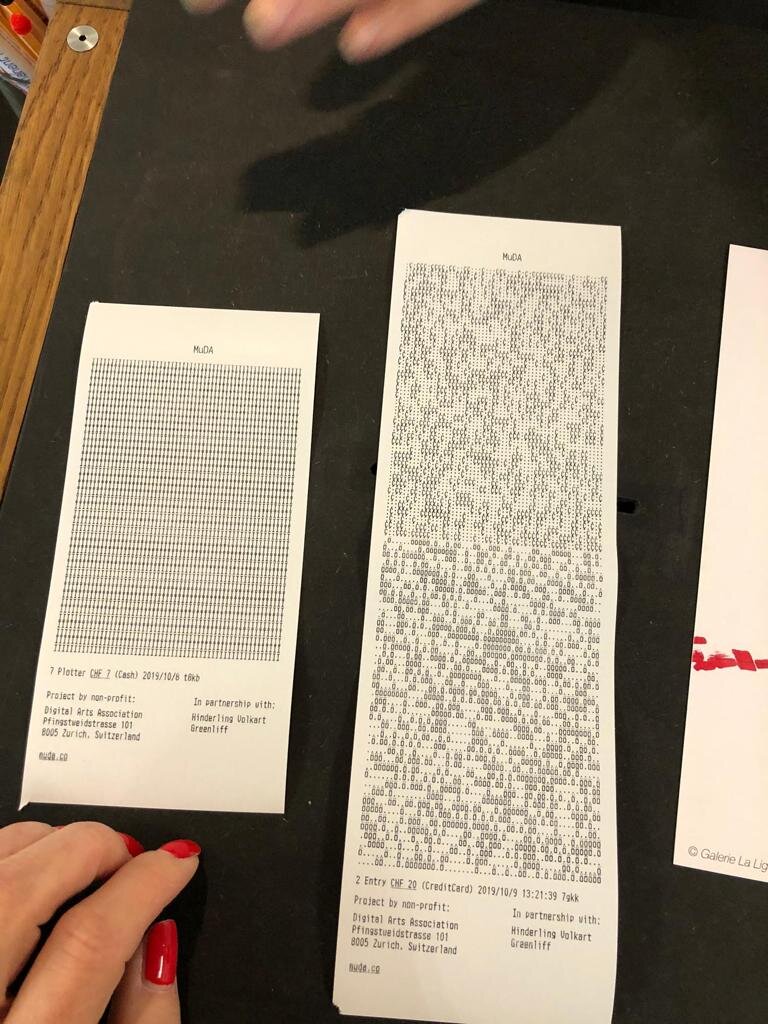
Exhibition at MOMA featuring Molnar:
https://www.moma.org/calendar/exhibitions/3863?locale=en
An interview with Vera Molnar and some of her works → https://computer-arts-society.com/uploads/writing-new-codes-catalogue.pdf
https://www.studiointernational.com/index.php/vera-molnar-interview-computer-art-paris-mayor-gallery
Articles
Articles, magazines, documentaries about the artist
Artforum - Hanna Magauer: https://www.artforum.com/print/reviews/201705/vera-molnar-67970
Vera Molnar’s Computer Paintings
Aline Guillermet Representations (2020) 149 (1): 1–30. https://doi-org.ezproxy.lib.umb.edu/10.1525/rep.2020.149.1.1
https://www.researchgate.net/publication/338896073_Vera_Molnar's_Computer_Paintings
Min Chen The Artist Who Drew with Computers, Before Computers Were a Thing, 2017 Surface Magazine
https://www.surfacemag.com/articles/vera-molnar-in-thinking-machines-at-moma/
Interview with Studio International
https://www.studiointernational.com/index.php/vera-molnar-interview-computer-art-paris-mayor-gallery

(Recreating - Toolkit Questions Collective Answers**)
Widen your perspective:

